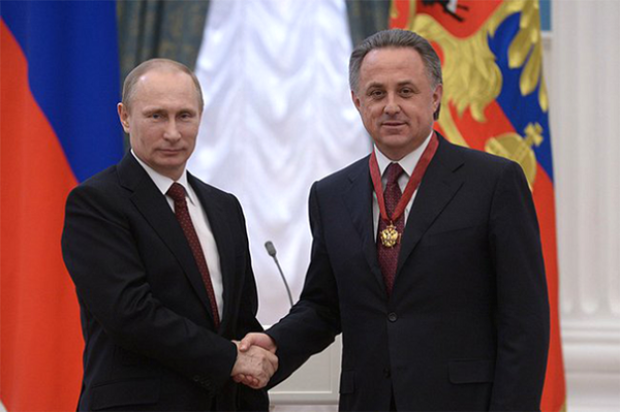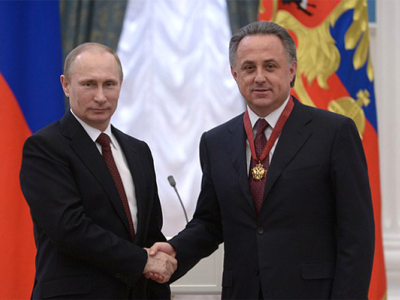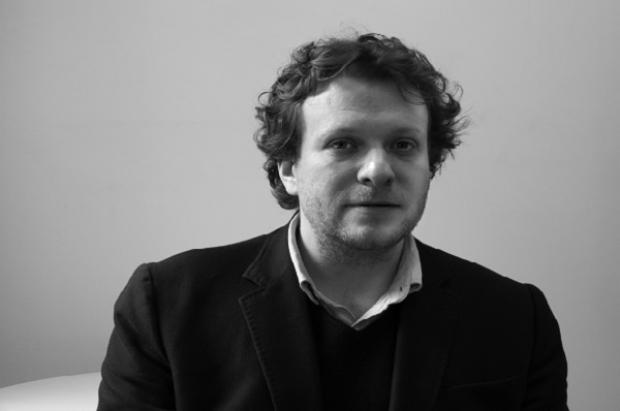Inside the Red Web
Andrei Soldatov and Irina Borogan’s The Red Web describes the evolution of surveillance in Russia, from the photocopier to the internet. They spoke to Little Atoms about the history and future of technology and freedom
1The KGB and technology
Andrei Soldatov You’d be very surprised to find that actually the KGB was not so technologically advanced, especially in comparison with Stasi. At the height of the Soviet powers and the powers of the KGB, the KGB was capable of wire-tapping 300 phone lines simultaneously in Moscow. So it’s a very small number of phone lines – the Stasi at the time intercepted hundreds of thousands of phone lines simultaneously in many regions of East Germany.
But at the same time everybody in Russia, including my parents, was convinced that their phones might be tapped by the KGB. That’s why we had this great Russian saying, “This is not a phone conversation”, which is still used in Russia. I had a meeting with a guy from the FSB who was Deputy Director of the FSB – a big general in charge of communication interception. I was not actually certain that he would appear in the meeting so I thought well maybe I can ask some questions right now. And he immediately said the same thing: “Andrei, it’s not a phone conversation.”
By the start of Perestroika, the dissident movement was almost non-existent
We came to the conclusion that the Soviet system and now the Russian system of surveillance was used not to actually spy on people, to find troublemakers and this kind of thing, but to intimidate the population. The problem was that in the Soviet times that unfortunately very few troublemakers. There were maybe two thousand dissidents in the whole of the Soviet Union.
Little Atoms: This would be in the 50s, 60s?
80s. Andropov actually crushed this movement. Lots of members were expelled, sent to jail, to trial. By the start of Perestroika, the dissident movement was almost non-existent.
So the thing for the KGB had to send a message. “You might be under control, you should be cautious.” And that worked.
2. The Soviet Xerox
Irina Borogan: There is this fascinating man, Vladimir Fridkin. He still works on his scientific research institute. He’s 85 but he’s still working. He was a young student, graduated from Moscow State University at a time when an anti-Jewish campaign was launched in the Soviet Union. He wanted to work with nuclear physics, but that was all at secret institute – for a Jew at the time it wasn’t allowed.
So he decided to do something helpful in some small scientific research institute he was allowed to join. He just invented a photocopier, at the same time as it was invented in the United States. It was very useful and good for an experimental template. The Soviet authorities engaged with this idea and they tasked one scientific research institute to improve some design, to make it smaller and more useful; they even tried to start mass production of the photocopying machines. Fridkin of course used the device for copying scientific research, scientific magazines for his friends, because, he told me, they were desperate for scientific news. It was 1952/1953 and most of scientists didn’t have any access to this information and even if they got some access they could only read some articles and they couldn’t copy it because there was no technology. Fridkin was one of the most popular men in his institution because everybody visited him to copy articles, mostly from physics and maths magazines.
Fridkin wanted to work with nuclear physics, but for a Jew at the time it wasn’t allowed
Until the moment when a beautiful young woman from from the KGB came into his room and said that she’d have to take away the copy machine and destroy it and smash it. And they did. Fridkin later found out a mirror that was part of this copying machine had been put on the wall in a ladies’ toilet. “My copy machine,” he told me, “the first copy machine in the USSR ended up in the women’s toilet.”
And the they stopped all research about photocopying. They said that some people could copy some prohibited materials and we can’t control this.
LA Eventually, the authorities ended up importing Xerox machines
AS But these Xerox machines were strictly controlled. There was a special room in all the institutes with he room was guarded and you had to have special clearance.
IB Fridkin’s first copy machine was in the scientific institute, and he used it and other people used it. But the Xerox machines imported from the West were only used by Party Leadership. They were in the Soviet Ministry, Soviet government and Central Committee of the Party, they weren’t for scientists or normal people.
3. Solzhenitsyn and The loyal dissident
AS When Solzhenitsyn was imprisoned he was sent to a research facility in to work on secure phone technology for Stalin. What Stalin wanted was to just pick up the phone to talk to someone and to have the thing encrypted. Stalin wanted to immediately recognise who he was talking to, and that was impossible then because if you had the stuff encrypted and then decrypted the voice would be unrecognisable. His people didn’t understand why, even when the quality of phone lines was so bad a human can recognise immediately the voice of whoever he is talking to; because it seems that very little is enough to recognise a voice.
They invited linguists to work on the problem.
One of these linguists was Lev Kopelev [who later became a dissident], who had actually developed a technology to be able to identify a traitor who betrayed a Soviet spy.
Solzhenitsyn was not actually a part of this identifying effort – he was told about it by Kopelev – but was not involved in it.
So Solzhenitsyn was sent back to the Gulag before the encryption research was completely done. When he was released he thought “well this might be a good idea to write a novel about”. But actually if you look at his novel [The First Circle] it looks like – in modern terminology it might look like non-fiction, actually. Solzhenitsyn changed all names in his novel except of the spy Koval, who was to go to New York to steal the secrets of atomic bombs. It turned out that Koval was a real name. What is more, Koval really was a very successful Soviet spy and he lived until 2006. Putin said that that the guy was the most successful Soviet nuclear spy during the war.
Kopelev, who was the main author of technology that identified a traitor. He never got back to his research. was always proud of what he did. He was very patriotic, so it was a very strange mixture. So you have a guy who became a very famous Russian dissident and at the same time he was proud that he helped the Soviet Secret Services. He was still a Marxist.
When I was inside of this story, I tried to talk to people who were involved and tried to trace what happened to this research facility and I always thought of this guy Kopelev, what he actually thought.
A year ago there was a conference in Warsaw. Dimitri Litvinov, the Chair of Russian Greenpeace was there. He was sent to jail for hooliganism because [of Greenpeace’s action at] Gazprom Rosneft platform. They spent a month in Murmansk prison. Litvinov is a very respected activist and the guy who was in charge of many things Russian Greenpeace did. He invited me to help him to present a documentary about these events. He asked me afterwards “what are you working on now?” And I said “Dima it’s such a strange story.” I told him the whole story and I said “Look I don’t understand this guy Kopelev. I think he was such a great guy but I don’t quite understand why he was so stupid.” And he told me, “Andrei, almost all my life I’ve thought about the same thing, because he actually my grandfather.”
4. Putin’s Internet
LA The Soviets were always trying to build parallel technologies several years behind everyone else. Did the Russian internet emerge in a similar way? In trying to figure out how to replicate technologies rather than just take. How did that emerge? Tell us about the growth of the Russian internet.
AS At the outset some Party officials were under the impression that they could limit the usage of the internet to these highly guarded and secret research facilities. That’s why they let them to establish these first connections. Andropov for example, was very interested in computers and personal computers and he helped to import some of them to the Soviet Union, and actually he wanted to develop this technology but they all thought that they could control these things and keep personal computers and communications and the internet inside of these elitist, highly secretive scientific organisations. They didn’t mean to open up this to average people. That’s why the internet in Russia actually appeared firstly in the most secretive research facility.
IB They were already under control.
AS They were maybe even sometimes even more powerful than the KGB because the system of the Soviet Union was that if you were protected by the Communist Party, by the Politburo, it means that you are actually higher up than the KGB. That’s why the Soviet Academy of Sciences sometimes might be rebellious and that’s why for example Sakharov was never sent to jail – because he was considered until the very last moment as part of the elite. And even academics wanted sometimes to protect him not out of respect, but just because they thought, wow he’s one of us. If we can send him to jail it means that tomorrow it might be me. So we need to protect him not because we respect him, he’s a bad guy, but we need to protect our clique.
Anyway that’s why we got the internet. But it seems nobody actually grasped what it meant, even in 1991. I love the story of how during the coup of 1991 Yeltsin’s people went to the office of the very first internet service provider and asked for them to copy some leaflets for Yeltsin and they were told, “Why do you need photocopies, we have the internet here, we can spread your message immediately” and Yeltsin’s people just said ‘What?”. They just didn’t understand. It developed it so fast that nobody actually grasped the significance of it, not the opposition or Yeltsin or the KGB.
And Putin was later but actually he also was very late to understand what it meant.
IB Putin didn’t believe in the internet. He was sure that it was a toy for a small amount of people, mostly intelligentsia and geeks. He was never interested in putting controls in the internet. There wasn’t any legislation on the internet until 2012. Everything was allowed. There wasn’t special legislation on the internet, of course yes if you post some child pornography and it was detected by the Police you could be punished by Police for spreading the pornography but not for spreading pornography on the internet.
LA Tell us about SORM
IB We were surprised that in the 90s when people were quite free and wouldn’t suppose it that it would be some punishment for expressing their opinions, why those people from ISPs and other companies didn’t oppose the idea of installing SORM [System for Operative Investigative Activities" the state surveillance system] on their servers. There was only company that went to court, and that failed. It was very, very important for us to understand why they didn’t oppose to the idea of surveillance. And we found out that…
AS It was not out of fear.
IB It was the mentality, unfortunately.
AS To be frank our first answer was well maybe they’re too close to the military companies, which is an obvious thing with most of the technical intelligentsia in the Soviet Union. Many of them actually worked for the military or security services. that was why. It poisoned them from the inside. But it seems it’s that’s only part of the answer, the other part is where that they, they have a special kind of education. They lack any training, any education in ethics. Nobody tried to explain them that you need to question. It’s not about fixing the problem, it’s about why we have this problem.
IB What I knew from my parents, who were engineers, was that they fully understood that the fax machine should be behind a locked door. I asked why. My mother said because somebody could use it and send abuse to the Ministry or or somewhere. “Mother,” I though, “that’s crazy idea, who around you is going to do that? They are all engineers, it’s a closed facility. Why do you think some people want to send some abusive messages to the minister by fax?”
LA Both of you to some extent had parents involved in this world.
AS My father [Alexey Soldatov] was a part of this world, and I have very difficult relationship with him because of many of these things. His latest project, when he was deputy communications minister, was to allow the usage of Cyrillics in URLS. We had a very big argument over this. His argument was, “Look Andrei, we just give new opportunities for people.” And my argument was when you make the web look localised it means that you install borders. Everybody can learn how to write w-w-w. It’s not so difficult. But if you present people who are newcomers to the internet essentially the same picture what we can miss is the global character of the net. which is important.
SORM is the same system that the NSA constructed in PRISM
I just remember my own impression of when I first got connected which was in 1995. My father showed me and I was really fascinated. Then it was all about UNIX, but he told me this website is in California. Wow. But this global character of the internet is a very important thing and if you deprive people of this feeling you are missing something.
LA How does Sorm work?
AS In Europe there are two lines of communications between the law enforcement agency and the telecommunications company. The first line is used to send code words then the company starts interception and the company personnel uses the second line to send back the results of the interception and this scheme should be everywhere, in Europe, in UK, in the United States because there are special standards for that. In the United States it’s CALEA and in Europe it’s ETSI, European Telecommunications Standards Institute. In Russia we have only one line. So technically it’s different. So the thing is that this line is not used to send a word, it’s used to get direct access, because in Russia the interception is conducted not by telecommunication companies’ personnel but by the FSB. So they just get access, they do something on the network and you have no right to know what is going on. The telecommunications company has no security clearance so they cannot see the code word.
They had this system because it was designed in the late 80s. Nobody had then thought about any kind of code word. So when the system was implemented in 1992 everybody thought we need a code word, some sort of thing because, we are a liberal, democratic country. So they wrote it in the legislation. Yes, you have this requirement for the word but as you see technically in the system is there is no place for this word. So what we got, we got a very peculiar system, that the FSB guy should get a word but he has no right to show this word. It’s all locked inside of the system.
It’s the same system that the NSA constructed in PRISM, but at that time they needed to violate American laws.
SORM is good at intercepting people who are already targets for surveillance. It was proved during the anti-Putin protests. Then the communications of opposition leaders and journalists were intercepted and leaked to the pro-Kremlin press and used to attack them. But in terms of controlling the whole thing, the whole of the internet, it’s not very effective.
5 Pour encourager les autres
IB The Soviet system was constructed to control people physically because our system was organised around a party hierarchy so as a party leader at the top controls. That system didn’t need such a lot of electronic surveillance as nowadays because people controlled each other, and it worked very well.
AS But now, nevertheless the principle is still the same. You have very few troublemakers and you use surveillance and or interception as a tool. It’s a minor difference between the Western approach and Russian approach to surveillance. In Russia mass surveillance is not a big thing because we have so-called targeted surveillance so we have people who are already identified and they are spied on. But the system doesn’t work in the way that you need to identify new troublemakers.
You just need to find some key people and send them to jail
So it’s the principle that’s different. For many reasons. One of them is legislature of the Soviet Union, another one is some technological problems because the Russian security services, to be honest, do not know what to do with large databases. To analyse and to work with them we need to import technologies from the West. Russians are not very good at producing databases and of course there’s still some exports limitations from the United States.
IB I can give you one example of intimidation on the net. For example, one Tatar activist, a person who, a man who lives in Tatarstan, was recently sent to prison for three years for posting his opinion on Crimean annexation. He was accused of extremism and got a three-year sentence in jail. His post was just about how he doesn’t support the Crimean annexation, and he called the Russian military in Crimea ‘occupants’. So that was all. Not a lot, not a big deal. But three years for one post on VKontakte. To compare, in Russia the jail sentence for killings is usually seven. That’s normal, seven years in prison. Three years for a post. It’s a very rare example but it’s very powerful.
AS You just need to find some key people and send them to jail. That will be enough. You do not need much suppression, we don’t have so many journalists sent to jail as, for example, Turkey. It’s completely different.
IB It’s enough to develop self-censorship on the social networks.







